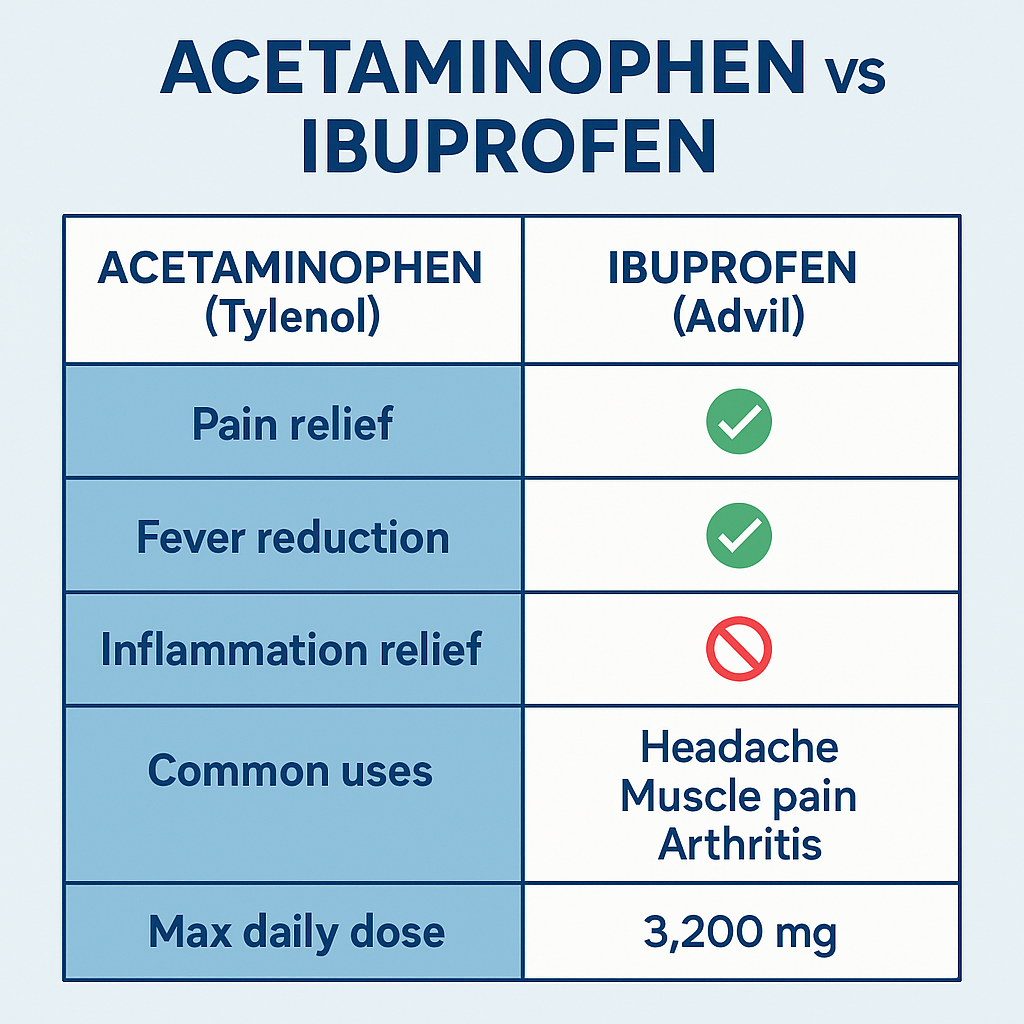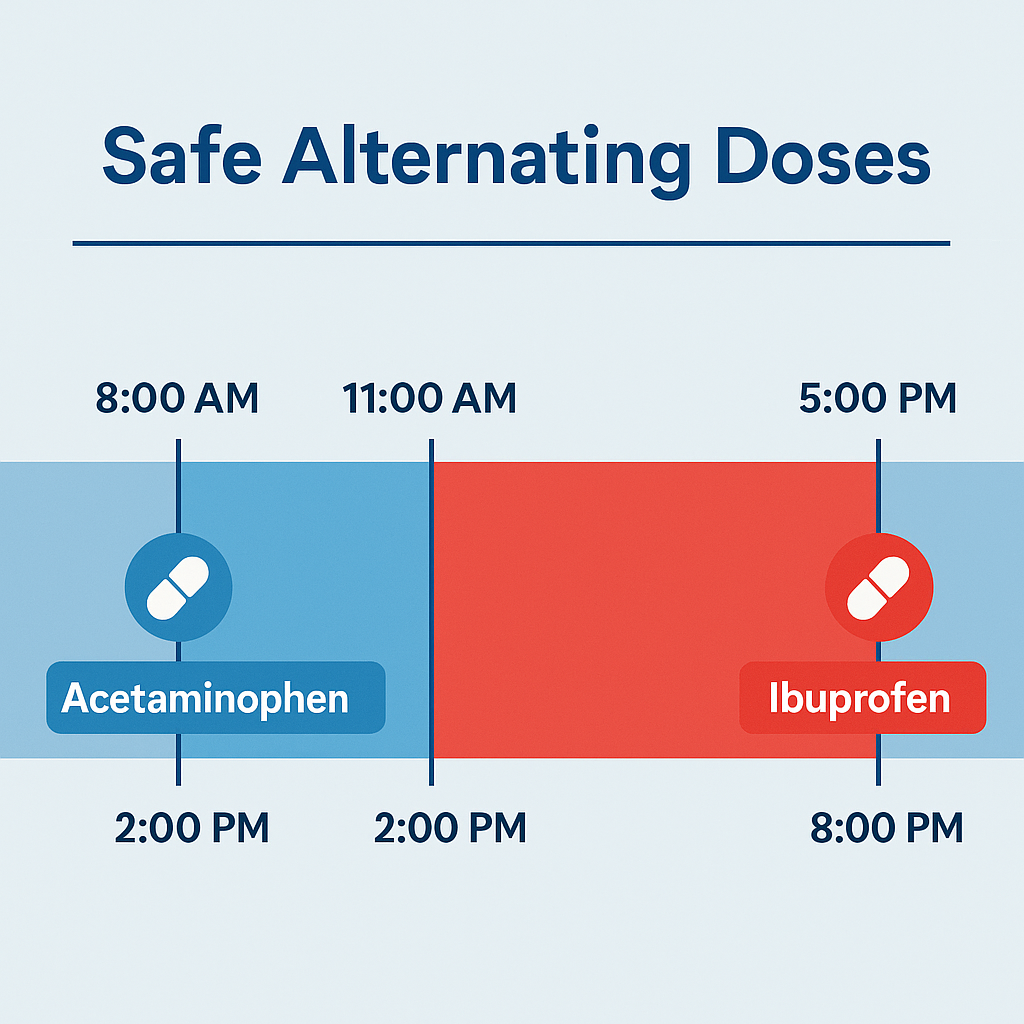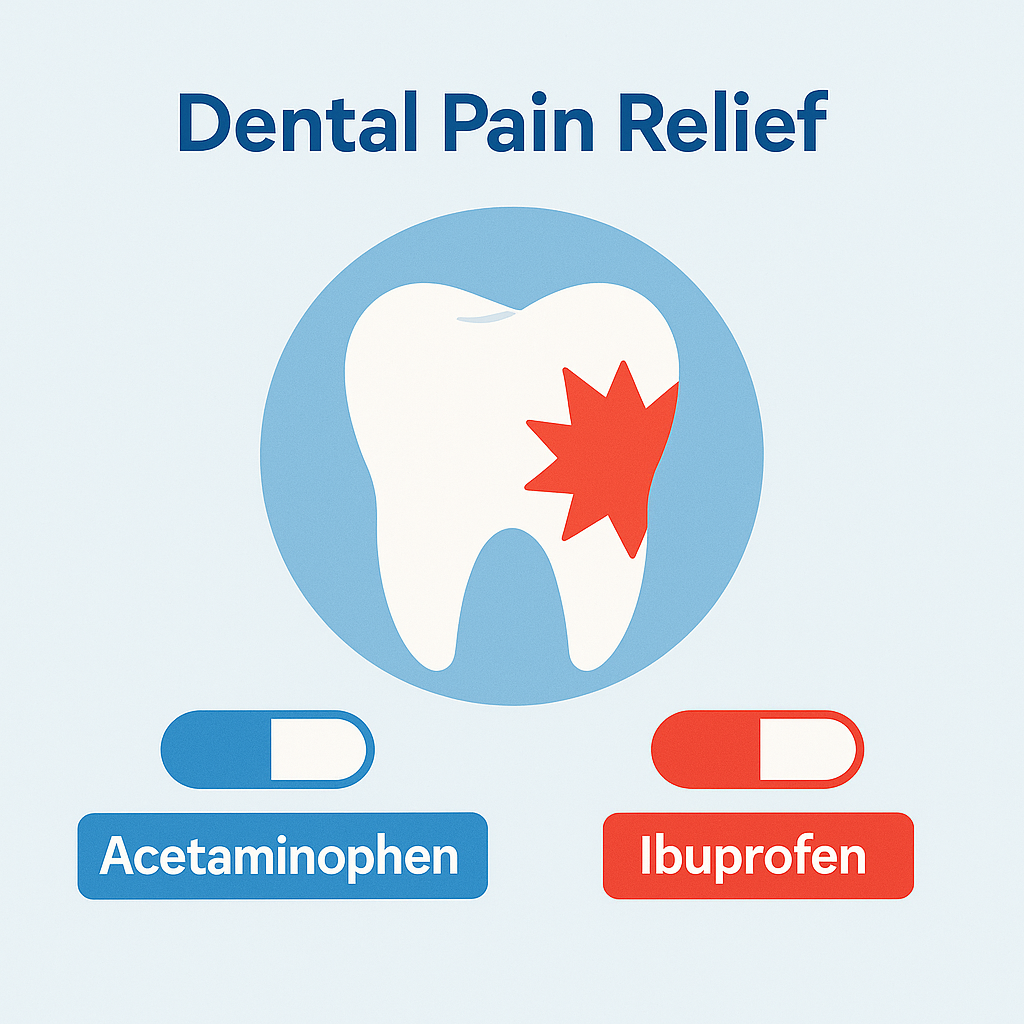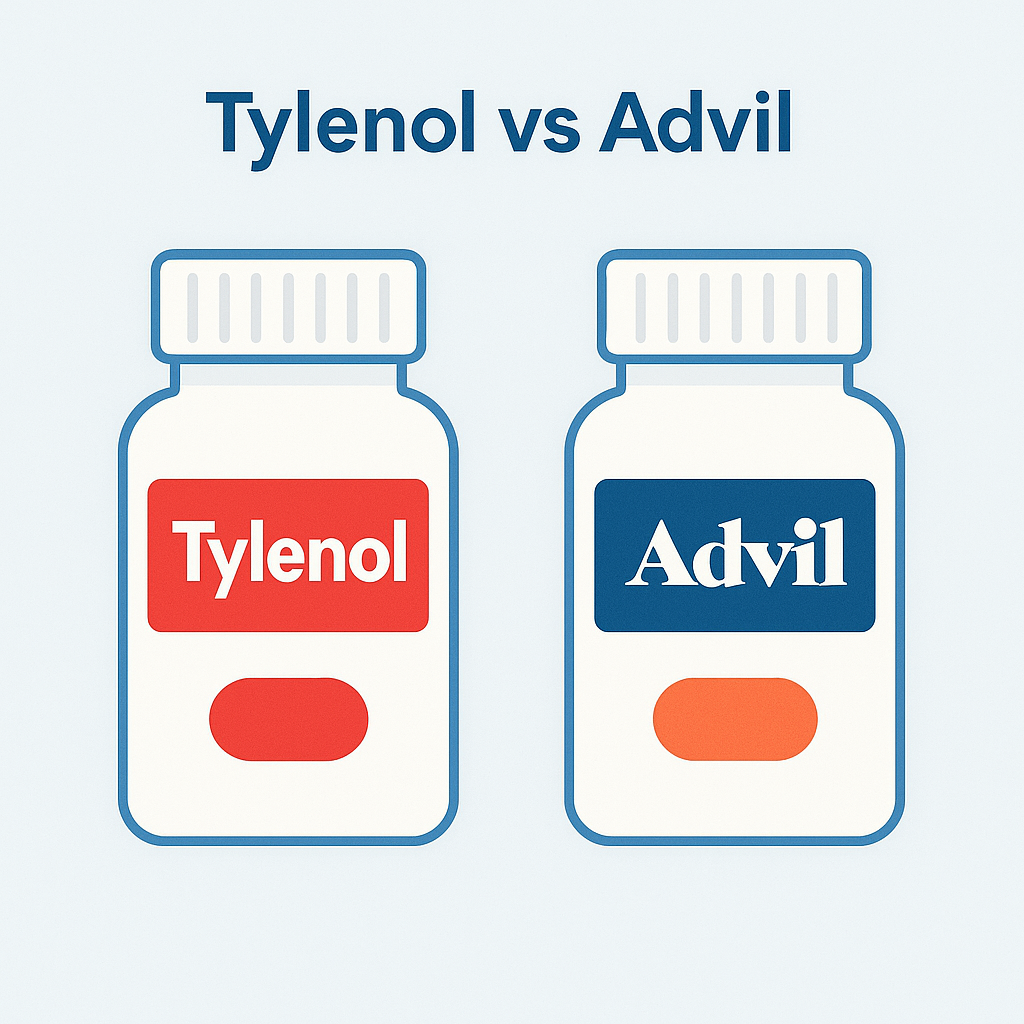Can You Take Advil and Tylenol Together? A Complete Guide to Combining Ibuprofen and Acetaminophen for Pain Relief
Pain is something we all face—whether it’s from a headache, a pulled muscle, or dental work. Two of the most widely used over-the-counter painkillers are acetaminophen and ibuprofen, better known by their brand names Tylenol and Advil. These medications are staples in most medicine cabinets because they’re effective, accessible, and trusted. But when pain gets more intense, like after surgery or injury, people often wonder if combining ibuprofen and acetaminophen for acute pain management might offer stronger relief.
In recent years, the question "Can you take Advil and Tylenol together?" has sparked growing interest. Healthcare providers are increasingly recommending combining ibuprofen and acetaminophen for acute pain management in certain situations—especially where minimizing opioid use is a priority. Both medications work differently in the body, which means they can complement each other when taken correctly. This potential synergy has made acetaminophen and ibuprofen a trending topic in both clinical and everyday pain management conversations.
This blog will explore whether acetaminophen and ibuprofen can be safely combined, how the dosing works, and what the evidence says about their effectiveness together. We’ll answer the key question—Can you take Advil and Tylenol together?—and offer practical guidance based on the latest medical recommendations. If you’ve ever considered combining ibuprofen and acetaminophen for acute pain management, this guide will help you understand when it’s safe, how it works, and what to avoid.

Understanding Acetaminophen and Ibuprofen
Acetaminophen, widely known by the brand name Tylenol, is a common over-the-counter pain reliever and fever reducer. It works by blocking certain brain signals that trigger the sensation of pain and heat. Unlike anti-inflammatory medications, acetaminophen does not reduce swelling. It's often recommended for headaches, menstrual cramps, and mild to moderate aches. The typical adult dose is 500–1000 mg every 4–6 hours, not exceeding 3000–4000 mg per day. In the ongoing debate of acetaminophen vs ibuprofen, Tylenol is usually preferred for people who need pain relief without the risk of gastrointestinal irritation.
Ibuprofen, found in products like Advil and Motrin, is a nonsteroidal anti-inflammatory drug (NSAID) that not only relieves pain and reduces fever but also decreases inflammation. It works by inhibiting enzymes involved in the production of prostaglandins, which are responsible for inflammation and pain. This makes it highly effective for conditions like arthritis, muscle strains, and dental pain. Common adult doses range from 200–400 mg every 4–6 hours, with a maximum daily limit of 1200–2400 mg depending on usage and medical supervision. When looking at acetaminophen vs ibuprofen, ibuprofen is typically favored for pain involving swelling or inflammation.
The choice between acetaminophen vs ibuprofen often depends on the type of pain and the individual’s health profile. Acetaminophen is easier on the stomach and safer for people with ulcers or sensitive digestive systems but can affect the liver if overused. In contrast, ibuprofen can irritate the stomach lining or increase bleeding risk, especially when taken long-term or on an empty stomach. However, its anti-inflammatory effects make it a better choice for injuries or inflammatory conditions. Understanding the pros and cons in the acetaminophen vs ibuprofen comparison helps patients and caregivers make informed, safer decisions for managing pain and fever.
Can You Take Advil and Tylenol Together?
Many people wonder, can I take Advil and Tylenol together when dealing with stubborn pain. The short answer is yes—under proper guidance, it can be both safe and effective. Can you take Advil and Tylenol together without risking overdose or side effects? According to medical experts, including the Mayo Clinic and CDC, the two medications work differently in the body: ibuprofen (Advil) reduces inflammation, while acetaminophen (Tylenol) targets pain and fever through the brain’s pain centers. This difference is what makes combining ibuprofen and acetaminophen for acute pain management a clinically supported strategy, especially for short-term relief.

The FDA and American Dental Association both acknowledge the benefits of alternating or combining these medications in specific scenarios, such as dental surgery, injury recovery, or post-operative pain. Can you take Advil and Tylenol together after wisdom tooth extraction or a sprain? Many doctors recommend it for stronger, longer-lasting relief without increasing the dose of either drug. Research shows that combining ibuprofen and acetaminophen for acute pain management can sometimes be more effective than opioids, with fewer side effects. The key is sticking to safe dosing intervals—usually every 6 hours, or alternating every 3 hours depending on the regimen.
Still asking yourself, can I take Advil and Tylenol together every time you get a headache or body ache? It’s important to know that while combining ibuprofen and acetaminophen for acute pain management is effective, it’s best reserved for moderate to severe pain, like post-surgery or dental procedures. You should always consult a healthcare provider before starting a combined regimen. So, can you take Advil and Tylenol together safely? Yes—but only when used correctly. Used wisely, combining ibuprofen and acetaminophen for acute pain management can be a powerful tool for short-term relief that avoids the risks of stronger medications.
How to Safely Combine Acetaminophen and Ibuprofen
Combining ibuprofen and acetaminophen for acute pain management can offer more effective relief than using either medication alone. This method is especially useful in cases of dental procedures, muscle injuries, or after surgery, where managing pain quickly and efficiently is a priority. A common approach includes an ibuprofen and acetaminophen combination dosage of 400 mg ibuprofen with 500 mg acetaminophen, taken either together or staggered every three hours. By targeting pain through different mechanisms—ibuprofen reducing inflammation and acetaminophen blocking pain signals—this combination provides broader relief while minimizing the need for higher doses of a single drug.
To optimize safety and effectiveness, it’s important to follow a proper ibuprofen and acetaminophen combination dosage schedule. For example, some people take ibuprofen first, then acetaminophen three hours later, repeating the cycle every six hours. Others may take both at once every 6 to 8 hours, depending on the severity of the pain and individual tolerance. This strategy not only enhances pain control but also reduces the risk of side effects associated with high doses of either medication. For those needing strong relief, especially in ibuprofen and acetaminophen combination dosage for dental pain, this method has shown great results and is supported by healthcare professionals when used short-term.
The duration of combining ibuprofen and acetaminophen for acute pain management should generally not exceed 3 to 5 days unless directed by a doctor. Short-term use helps prevent complications like liver strain from acetaminophen or gastrointestinal issues from ibuprofen. People managing ibuprofen and acetaminophen combination dosage for dental pain, musculoskeletal injuries, or post-operative discomfort often find this method more effective than opioids and with fewer risks. When used responsibly, the ibuprofen and acetaminophen combination dosage can offer significant relief, making it a popular and recommended strategy in modern pain management.

Advil Dual Action with Acetaminophen: What You Need to Know
Advil Dual Action with Acetaminophen is a unique over-the-counter (OTC) medication that combines two powerful pain relievers—ibuprofen and acetaminophen—into one convenient pill. This innovative product is the first FDA-approved medication to offer both ingredients in a single tablet. Unlike taking two separate medications, Advil dual action with acetaminophen simplifies dosing and helps avoid confusion about timing and dosage. It’s designed for people seeking fast, effective relief from moderate pain like headaches, muscle aches, backaches, or dental pain.
The way Advil with acetaminophen works is by leveraging the strengths of both drugs: ibuprofen targets inflammation at the source, while acetaminophen works on the brain’s pain signals. This dual mechanism provides stronger and longer-lasting relief than either ingredient alone. For many, Advil dual action with acetaminophen offers an ideal solution when stronger relief is needed but prescription medication isn’t warranted. It’s most appropriate when dealing with acute pain that isn't relieved by standard doses of single-ingredient meds, but it's important to always follow the dosing instructions on the label.
When comparing Advil with acetaminophen to taking separate pills, the combination can be more convenient and reduce the risk of accidentally doubling up on doses. This FDA-approved formula meets strict safety standards, giving consumers peace of mind. Although prescription-strength combinations are available, Advil dual action with acetaminophen offers an accessible OTC option without the need for a doctor’s visit. For people who need effective relief on the go, Advil with acetaminophen delivers a clinically backed solution in one easy-to-take tablet.
6. Risks and Precautions
Combining pain relievers like acetaminophen and ibuprofen can be effective, but it’s important to understand the risks. Acetaminophen, while gentle on the stomach, can cause liver damage when taken in high doses. On the other hand, ibuprofen may irritate the stomach lining and affect kidney function, especially with prolonged use or in people with preexisting conditions. Anyone with liver disease, kidney problems, ulcers, or a history of gastrointestinal bleeding should consult a healthcare provider before trying any ibuprofen and acetaminophen combination dosage. Pregnant women and people on blood thinners should also exercise caution before combining these medications.
When considering an ibuprofen and acetaminophen combination dosage for dental pain or general pain relief, adults should follow clear dosage guidelines to stay safe. Typically, a safe approach is 400 mg of ibuprofen every 6 hours, paired with 500–650 mg of acetaminophen every 4–6 hours, not exceeding 3,000 mg of acetaminophen or 1,200 mg of ibuprofen per day without medical supervision. Some prefer alternating the two medications every 3 hours (e.g., ibuprofen at 12 p.m., acetaminophen at 3 p.m.) to maintain steady relief without exceeding maximum daily limits. This alternating method can be especially helpful when following an ibuprofen and acetaminophen combination dosage for dental pain, where consistent relief is essential.
To avoid overdose or damage to vital organs, stick to recommended intervals and never double up doses. Watch for signs of overdose such as nausea, confusion, stomach pain, or unusual fatigue. If you’re following an ibuprofen and acetaminophen combination dosage and notice any of these symptoms, seek medical help immediately. Using a medication tracker or setting alarms can help prevent accidental double dosing. For dental pain, an ibuprofen and acetaminophen combination dosage offers targeted relief, but only when used responsibly and with attention to timing and quantity. Always talk to your dentist or doctor before starting a new pain management routine, especially if using an ibuprofen and acetaminophen combination dosage for dental pain frequently.

7. When to See a Doctor
While combining acetaminophen and ibuprofen can offer effective short-term relief, it’s important to recognize when home treatment isn’t enough. If your pain continues for more than a few days without improvement, or worsens despite medication, it may be a sign of an underlying issue that needs medical attention. Pain that lingers or returns frequently could indicate something more serious, such as nerve damage, infection, or a chronic condition.
Certain medical situations always require professional supervision. Individuals with liver disease, kidney problems, ulcers, or bleeding disorders should not self-medicate without consulting a healthcare provider. The same caution applies to people who are pregnant, breastfeeding, or taking medications that interact with pain relievers. Even seemingly mild symptoms can escalate quickly if the root cause isn’t addressed properly.
If you're managing long-term or recurring pain, relying solely on over-the-counter medications isn’t a sustainable solution. Doctors can provide safer alternatives, including prescription medications, physical therapy, or other treatments tailored to your condition. Don't wait until the pain disrupts your sleep, mobility, or quality of life — early medical guidance can lead to better outcomes and peace of mind.
Final Thoughts: Safe Use of Acetaminophen and Ibuprofen Together
Combining acetaminophen and ibuprofen can be an effective way to manage acute pain, especially when single-medication approaches fall short. Whether you're dealing with dental pain, post-operative discomfort, or muscular aches, using Advil and Tylenol together has been shown to offer enhanced relief without significantly increasing side effects—when done correctly. Understanding the proper ibuprofen and acetaminophen combination dosage is crucial to avoid accidental overdose, especially since these medications are often taken separately and not recognized as a combined treatment by many users.
To safely take acetaminophen and ibuprofen, timing and dosage are everything. Experts often recommend either taking Advil and Tylenol together at the same time for stronger pain control, or spacing them out every few hours to maintain consistent relief. Whichever method you choose, you must follow trusted guidelines for the correct ibuprofen and acetaminophen combination dosage. Too much acetaminophen can damage your liver, while excess ibuprofen increases the risk of stomach bleeding and kidney issues. By being intentional with how you combine acetaminophen and ibuprofen, you can experience real pain relief without risking your health.
If you're unsure about how to manage pain with Advil and Tylenol together, or how to calculate the correct ibuprofen and acetaminophen combination dosage, it’s always best to speak with your healthcare provider. They can guide you based on your medical history and specific condition. When used responsibly, acetaminophen and ibuprofen can be a powerful, safe solution for short-term pain—just be sure to respect dosing limits and never self-medicate long-term without medical advice. Safe relief is possible when you combine Advil and Tylenol together with care and clarity.
Frequently Asked Questions
Can I take Advil with acetaminophen?
Yes, you can take Advil (ibuprofen) with acetaminophen (Tylenol) safely, as they work through different mechanisms. Ibuprofen is a nonsteroidal anti-inflammatory drug (NSAID) that reduces inflammation, while acetaminophen is a pain reliever and fever reducer. When used together, they can provide more effective pain relief than either medication alone—especially for acute pain like headaches, back pain, or post-surgical discomfort.
How far apart should I take ibuprofen and acetaminophen?
If you’re not taking a combination product like Advil Dual Action, a common method is to stagger the two medications: take ibuprofen every 6–8 hours and acetaminophen every 4–6 hours. For example, you can alternate them every 3 hours to ensure consistent pain control without exceeding safe dosage limits. Always follow recommended guidelines or consult your doctor to tailor a schedule to your needs.
What is the best combination dosage for dental pain?
For adults managing dental pain, a common over-the-counter combination is 400 mg of ibuprofen plus 500–1000 mg of acetaminophen every 6–8 hours as needed. Studies show this combo can be as effective—or more—than some prescription opioids for dental procedures. However, you should not exceed 3,200 mg of ibuprofen or 3,000 mg of acetaminophen per day unless advised by a healthcare provider.
Is Advil Dual Action better than taking them separately?
Advil Dual Action with Acetaminophen combines 250 mg of ibuprofen and 500 mg of acetaminophen in one tablet, offering convenience and consistent dosing. While the effectiveness is comparable to taking the two drugs separately, the combo product simplifies your routine and may reduce the risk of accidentally doubling doses. However, it has fixed dosages, so if you need to adjust amounts based on pain severity or personal tolerance, separate pills might offer more flexibility.
What’s the difference between Tylenol and Advil?
The main difference lies in how they work. Tylenol (acetaminophen) relieves pain and reduces fever but does not treat inflammation. Advil (ibuprofen), on the other hand, reduces pain, fever, and inflammation, making it ideal for issues like arthritis or dental swelling. Both are effective, but your choice may depend on the type of pain, your medical history, or risk factors such as liver or stomach conditions.
When used responsibly and alternately, Tylenol and ibuprofen can be a safe, effective combo for pain relief. Track your medication timing and side effects with MedsideCheck to stay within safe limits.
For more on medication interactions, read about alcohol and antibiotics or Benadryl and Xanax combinations.